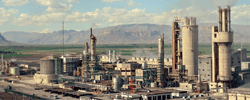Reza Ganji, the CEO of Jam Pilen Petrochemical, has said the company has entered into the production of new grades in line with research and development and it intends to increase the diversity of its products. According to Ganji, due to the decrease of feed and the problems of propylene producers, the company is trying to increase the variety of its products and move towards the targeted production of grades with high added value.
Ganji also added that in order to diversify the products, the company has envisaged three grades for the current year, two of which are in the field of packaging. He said of the two grades in the field of packaging, first grade was unveiled at Tehran International Oil show and 2nd grade in the 18th Iran Plast exhibition, and 3rd polypropylene grade will be unveiled by the end of this year.
He referred to the long-term work plan of research and development in order to diversify products and said the company has envisaged three grades for the current year, two of which are in the field of packaging. The company has also entered the field of chemicals, and since most of them are imported, producing them internally will save a great amount of cash for the country.
He further said that in the issue of production, the item of energy saving is very important, and the main problem that the downstream industrial units are currently suffering from is power outages. He noted that last year, the company unveiled a grade that is used in the production of plastic containers, which helped downstream producers to lower their energy consumption and decrease prices. He also expressed hope that these new grades will reach the commercialization stage, which will affect various industries in Iran. According to Ganji, meetings have been held at the Iran Plast exhibition, and based on discussions, production was carried out.
Ganji also referred to the time of lifting the ban on the export of Jam Pilen production grades and said the move depends on the state of the domestic market, and the priority is to supply raw materials and polypropylene to active domestic industrial units. He said if the problem is not resolved and the domestic market is not stabilized, it will be impossible for the authorities to allow the export of polypropylene. He also said the company is doing its best, especially in the polypropylene working group, to get an export license and expressed hope that the relevant authorities would work with the company in this field. He said in the first five months of this year, the company managed to set records in all areas compared to the same period in previous years.
The CEO of Jam Pillen said the main problem the company faces in its exports is the fact that polypropylene has been recognized as a semi-raw material, and this has caused 10% of duties to be levied, which makes the export uneconomical. He also called on the officials to remove the export ban and export duties. He said the issue of export is a special priority for an industrial unit, a long-term and strategic view, and if this is not the case, the industrial unit will eventually be out of competition.
He noted that downstream industries are really in need of raw materials and polypropylene so that they can work at full capacity. Full capacity for these industries will manifest itself through attracting more people, higher financial turnover, and more production. He said these two issues of meeting domestic needs and the possibility of exporting should be seen together.
We are considering entering the polypropylene value chain
Ganji noted that the solution to lifting the ban on polypropylene exports is to use projects such as Arghvan Gostar Ilam and PDH/PP projects to re-market.
He said with the increase in the price of polypropylene, downstream industries will face problems. That’s because it’s a chain, and inevitably, when a change is to be made, the whole chain must be considered. He said in order to get a good result, it is necessary for the governing bodies in different areas to have a meeting and make a decision.
Regarding whether a shortage exists more in film grades, Ganji noted that there is a shortage in film grades because they are used in the form of packaging, and it is very important. He said the two new grades that we unveiled at the Tehran Oil Exhibition and Iran Plast Exhibition are in the field of packaging, which increases the quality of packaging and, on the other hand, reduces the cost and energy consumption.
He said the value chain and downstream project of SAP superabsorbent polymer have been defined in this company and noted that the value chain units are in the company’s long-term plan. According to the general policies of the government, the company should not compete with the private sector. Therefore, the company’s entry into this field will be very cautious, with comprehensive and complete investigations in line with the added value for the collection. It should be noted that Jam Pilen is affiliated with the Civil Servants Pension Fund, and any revenue that is obtained in this area will go directly to the retirees.
Jam Pilen invests in its feed supply to realize the nominal production capacity
Ganji added the company is carefully studying the value chain so that it does not interfere with the general policies of the private sector. He said the company has never been able to reach the full production capacity due to the lack of feed in carrying out its work priority, which is the production of polypropylene. He noted that if the company is going to enter and invest in this field, it is desirable to do so in an area that can complete its feedstock and bring it to full production capacity.
Source: Jam Pilen petrochemical Department of Public & International Affairs





















